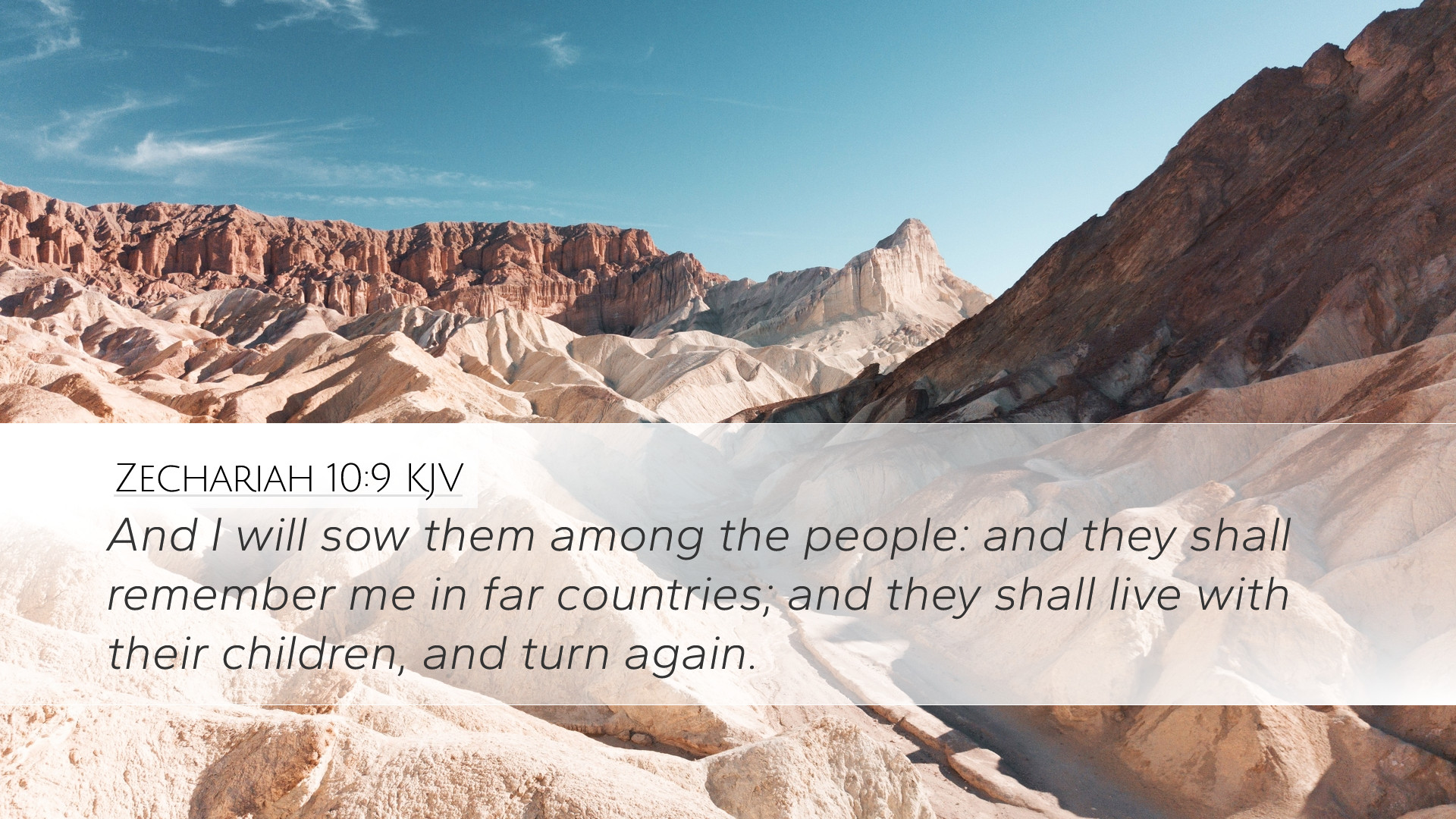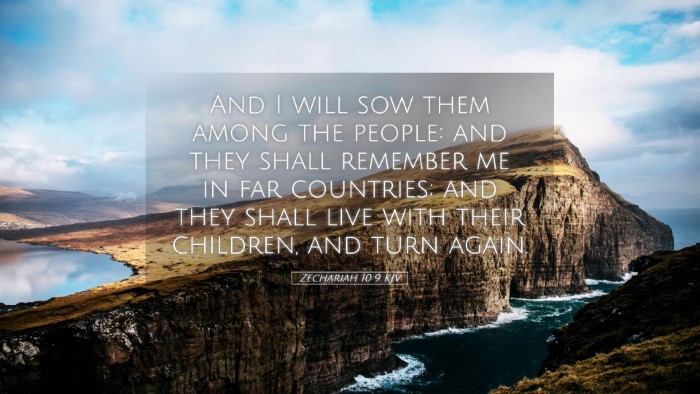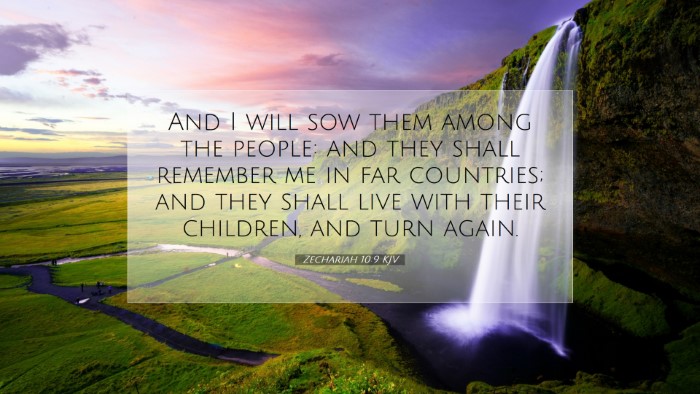Old Testament
Genesis Exodus Leviticus Numbers Deuteronomy Joshua Judges Ruth 1 Samuel 2 Samuel 1 Kings 2 Kings 1 Chronicles 2 Chronicles Ezra Nehemiah Esther Job Psalms Proverbs Ecclesiastes Song of Solomon Isaiah Jeremiah Lamentations Ezekiel Daniel Hosea Joel Amos Obadiah Jonah Micah Nahum Habakkuk Zephaniah Haggai Zechariah MalachiZechariah 10:9
Zechariah 10:9 KJV
And I will sow them among the people: and they shall remember me in far countries; and they shall live with their children, and turn again.
Zechariah 10:9 Bible Commentary
Commentary on Zechariah 10:9
Verse: "I will sow them among the people: and they shall remember me in far countries; and they shall live with their children, and turn again." – Zechariah 10:9
Introduction
This verse from the book of Zechariah provides deep insights into God's restorative plans for His people. The context of the verse comes after a series of prophecies concerning the restoration of Israel, signaling hope and the renewal of Israel's identity among the nations. The prophetic imagery not only illustrates God's sovereign hand in the history of Israel but also highlights His grace and the coming redemption. This commentary draws upon insights from notable public domain commentaries, providing a multifaceted exploration of this significant verse.
Contextual Overview
Zechariah, a post-exilic prophet, speaks to a people returning from Babylonian captivity. His prophecies serve as both a comfort and a challenge, encouraging the Israelites to rebuild not only their physical walls and Temple but also their spiritual lives. The theme of restoration permeates chapters 9 to 14, with a focus on the eventual coming of the Messiah and the final restoration of Israel.
The Meaning of the Verse
In Zechariah 10:9, several significant themes emerge:
- Sowing Among the Nations: The imagery of sowing signifies dispersion, suggesting that God will intentionally place His people among various nations for a purpose. This points towards a missionary aspect of God's plan, wherein the Israelites are to be witnesses to the nations.
- Remembrance of God: The promise that they shall “remember me in far countries” indicates a restoration of faith. It signifies the return to an acknowledgment of God’s sovereignty and power, despite being in foreign lands.
- Generational Blessing: The mention of living with their children indicates not only physical survival but also a spiritual inheritance. The faith of the ancestors is to be passed down, reinforcing the importance of community and continuity in faith.
- Return to Homeland: The phrase “turn again” emphasizes the ultimate return to their homeland, which is a motif of redemption seen throughout Biblical narrative.
Theological Implications
Several theological implications arise from this verse:
- God’s Sovereignty: This verse underscores God’s control over the affairs of nations and His active role in guiding His people. Matthew Henry notes that regardless of circumstances, God’s purpose stands firm to call His people back to Him and restore their fortunes.
- Hope for the Exiled: Albert Barnes emphasizes the hope inherent in this passage for those in exile, portraying a foretaste of the Gospel’s reach across all nations. This fulfillment is ultimately realized in the New Testament through the Great Commission.
- Redemption and Restoration: Adam Clarke highlights that while the verse refers to the physical return of Israel, it also has a deeper spiritual meaning as it pertains to the spiritual restoration that comes through Christ, which was foreshadowed in the Old Testament.
Insights from Commentaries
Matthew Henry
Matthew Henry emphasizes the metaphor of sowing, interpreting it as God's intention to cultivate a new identity for His people among Gentiles. He notes that this waiting for God’s intervention is integral to faith, as the Israelites are reminded of their spiritual roots away from home.
Albert Barnes
Barnes elaborates on the notion of remembrance, pointing out that unlike the past, when the Israelites often forgot God, this promise entails a heartfelt return to Him, ensuring that future generations would not forsake His commandments. The promise indicates that their trials serve a divine purpose, nurturing a deeper faith.
Adam Clarke
Clarke adds that this verse can also be interpreted in light of the eschatological hopes found within scripture. The final restoration is not merely a return to land but indicates a profound reestablishment of covenant relationship between God and humanity, a theme actively pursued in the New Testament through the ministry of Jesus Christ.
Applications for Today
For pastors, theologians, and students of the Word, Zechariah 10:9 offers rich ground for practical application:
- Understanding God’s Mission: The call to be sowers among the nations reflects the church’s mission today. Christians are charged with the evangelistic task of spreading the Gospel to all nations, embodying the global vision articulated in Zechariah.
- Encouraging Overseas Ministries: This promise can serve as an encouragement to support missionaries and church plants in foreign lands. There is a biblical precedent for believers to take part in God’s global work.
- Spiritual Legacy: The emphasis on generational faithfulness encourages families and churches to prioritize the teaching of God’s Word to ensure that future generations remember and honor Him.
- Finding Hope in Exile: For individuals feeling spiritually exiled or distanced from God, this verse reassures them of God’s unchanging presence and plans for restoration.
Conclusion
Zechariah 10:9 stands as a profound reminder of God's relentless love and restorative purpose for His people. As contemporary followers of Christ reflect on these ancient words, may they draw inspiration for their personal walks with God and their collective mission to spread the Good News across the globe. In understanding this verse, we not only engage with the history of biblical revelation but also embrace the ongoing story of redemption that binds us to the past, present, and future.


